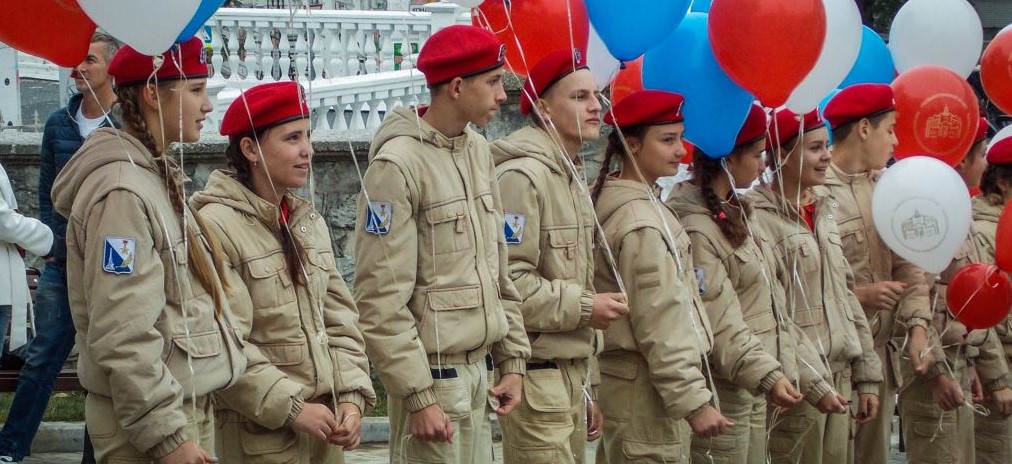Children taught how to hunt ‘the enemy’ and disperse protests in Russia and occupied Crimea

In a recent ‘military game’ in occupied Crimea, Russia’s Defence Ministry had children pretending to be military intelligence agents and gathering information about ‘the enemy’. Those in any doubt that opponents of Russia’s occupation of Crimea could one day be named as the ‘enemy’ would be advised to follow Russia’s activities in its own country. In Yekaterinburg, for example, a ‘patriotic event’ staged for children enlisted into the Defence Ministry’s ‘Yunarmia’ [‘Youth Army’] involved two vanloads of ‘military police’ using force to disperse protesters.
Better optics were found for the storyline used by the Yekaterinburg military with the children told that the four young men violently detained had come with sticks and Molotov cocktails and “started disturbances outside a checkpoint … in order to organize entry to a military site”. That would be more convincing if the large number of young people, some just schoolkids, detained with brutal force in Russia over the last year had not simply been present at anti-corruption demonstrations.
The creation of this ‘youth army’ was first mentioned back in January 2016, with Yunarmia officially registered at the beginning of August 2016. Although the direct link with the Kremlin hidden behind phrases like “supported by Russian President Vladimir Putin” it seems likely that this ‘army’ was always planned as part of the ‘Russian Movement of School Students’, created by presidential decree on October 2015.
There was considerable propaganda about this formation and an enormous drive for numbers from the outset, and there have been suggestions that enrolment of children is by no means as voluntary as claimed.
Russia’s Defence Minister Sergey Shoygu has quite openly stated that a major goal of the Yunarmia movement is to popularize military ideology and foster a special bond “between young Russians and the army”. The so-called ‘military-patriotic’ education involves wearing military uniform and learning how to use firearms. The idea is inculcated of victory in war with the help of armed conflict.
Russia is now aggressively pushing this supposed ‘military-patriotic’ education on children in occupied Crimea.
In early February 2019, the Russian military opened a so-called Yunarmia ‘military-patriotic centre’ in occupied Sevastopol, where children are to be taught how to use Kalashnikov rifles and other weapons.
Although the ‘military quest’ on 10 February does not seem to have been specifically for Yunarmia members, the overall aims were clearly similar. According to the Defence Ministry’s announcement, “young patriots had to gather as much different information as possible about the enemy, uncover their opponent’s secret plan, overcome complicated obstructions and save comrades in need”.
There was no specification as to who this ‘enemy’ is supposed to be, however monitoring of Russian-controlled and Russian media in Crimea in 2018 found a dangerous level of hate speech directed against Crimean Tatars and Ukrainians and everything linked with Ukraine in general.
Russia’s physical militarization of occupied Crimea has been coupled with aggressive glorification of war, with children especially targeted. The Crimean Human Rights Group has repeatedly warned that such actions help to inculcate a cult of war and tolerance for violence. By engaging children in paramilitary and enforcement structures of the occupying state, Russia is encouraging an aggressive attitude to states and peoples who do not support its so-called ‘Russian world’ doctrine and aggressively pushing a ‘Russian identity’ on occupied territory.
See also Crimean children take oath to serve as friends of the Russian FSB





